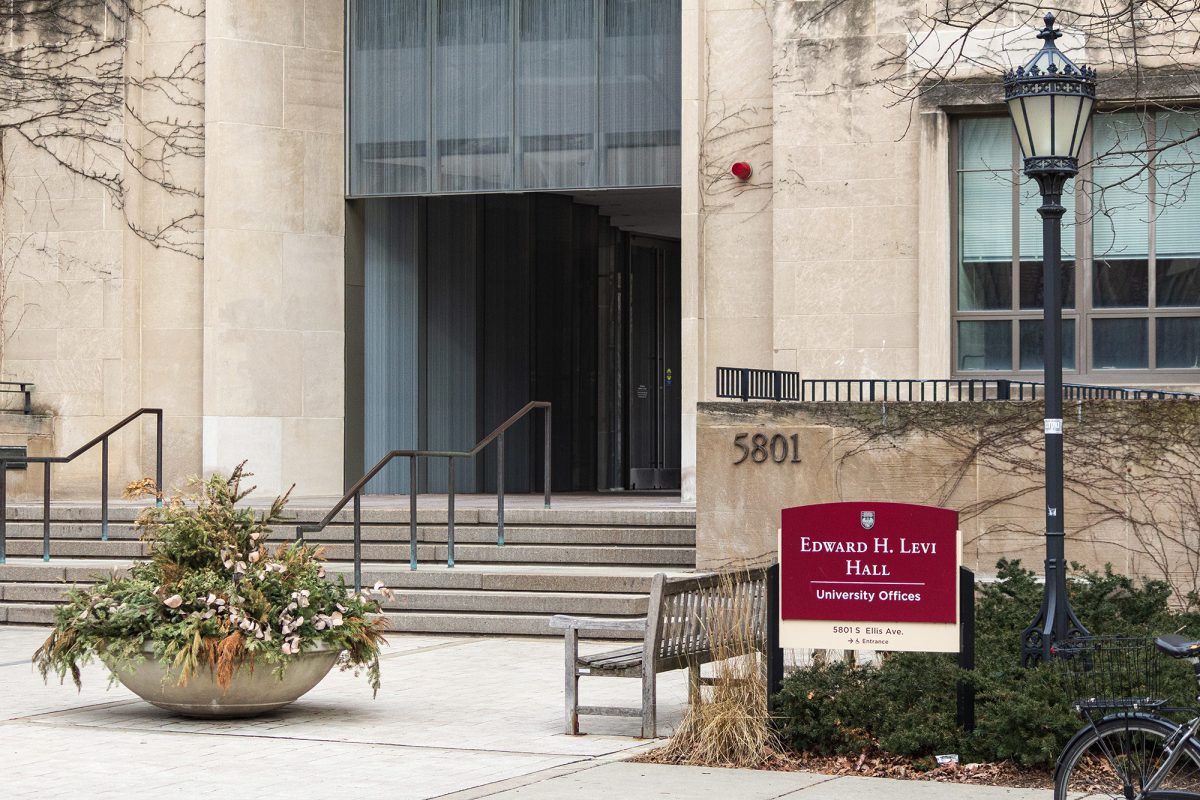The University will no longer allow non-tenure-track faculty to pay for personal research expenses using “professional development” funding, according to an Office of the University Provost memo obtained by the Maroon. The Office of the University Provost announced the change to the faculty College Council on February 25 and has already communicated the updated guidelines to instructional faculty in several divisions.
“The advancement of a Lecturer’s own research agenda is not an appropriate justification for the use of professional development funding,” the memo reads. Instructional faculty are primarily tasked with conducting research into “methods and techniques for effective teaching of their subject matter.”
Instructional faculty will no longer be able to apply professional development funding toward “expenses related to original research activity,” according to the memo, which argues that original research is not a necessary part of “maintain[ing] subject matter expertise as their field changes,” a requirement for lecturers and other instructional faculty.
Previously, professional development funds could be applied toward attending conferences where instructional professors presented their research, along with other expenses that “enhance the Lecturer’s pedagogy or subject matter expertise in their respective fields.”
For example, instructional professors can “use the funds to go to a conference and take in the research of others…. but they can not use the money to present their [own] research,” according to a source with knowledge of the matter.
“Original research in the field of their engagement… falls outside the typical duties assigned to a Lecturer,” the memo reads. “While the University expects each Lecturer to maintain subject matter expertise as their field changes as part of their professional development (and one-ninth of a full-time Lecturer’s position is typically assigned to this), maintaining such expertise and knowledge does not require conducting original research.”
“Attending a conference on genetics to learn about recent results in the field in order to incorporate these results into revised syllabi and course materials is an appropriate use of professional development funds,” the memo continues. “But attending a conference to present a paper with original research on genetics will not generally be considered appropriate and is not justifiable solely on the basis that the research will ‘inform’ the Lecturer’s teaching.”
The change will also limit instructional professors’ ability to travel for the purpose of accessing archives or conducting research, according to a source with knowledge of the matter.
The change will only apply to faculty covered by the Collective Bargaining Agreement (CBA) ratified by Faculty Forward in November 2024, which is still being finalized according to a union representative who spoke to the Maroon. Those faculty include non-tenure-track academic appointees, non-supervisory senior lecturers, teaching fellows, and others, collectively referred to as instructional professors (IPs) or instructional faculty. The change will not apply to tenured and tenure-track faculty, distinguished service faculty, research faculty, and other faculty members not covered by the CBA.
In an email, a representative of Faculty Forward told the Maroon that “[union] members are reviewing the new guidelines to make sure they’re consistent with the language of the new CBA negotiated between the union and management last year.”
Under the new CBA, covered full-time faculty members receive a minimum of $2,500 in professional development funding annually. Other faculty members, including writing instructors and some lecturers, receive $1,700.
When applying for professional development funding, the previous CBA instructed faculty members to identify “how such activity will enhance the Lecturer’s pedagogy or subject matter expertise in their respective fields, how the activity advances the University’s teaching mission and the Lecturer’s performance of their teaching duties.” It did not include examples of what fell within those categories.
Now, the provost’s memo provides lists of expenses that will typically be permitted or denied under the new guidelines and argues that original research is not required for building subject matter expertise.
According to sources with knowledge of the February 25 College Council meeting, the decision was made unilaterally by the University and originated in University Provost Katherine Baicker’s office.
Faculty members and union representatives were not consulted, and the change was not a direct part of the collective bargaining process.
The College Council is a body composed of elected and appointed faculty members charged with legislating admissions, instruction, examination, and grading, among other matters within the College.
Sources with whom the Maroon spoke believe the change is likely a direct consequence of the recently renegotiated CBA, which emphasizes the role of instructional professors as teachers rather than researchers. Although most instructional professors also conduct research in their respective fields, University officials present at the Council meeting indicated that the University wanted to create what one source called a “brighter line” between research and teaching.
“This is less consequential than it is humiliating and punitive,” one tenure-track faculty member said. “I think it’s insulting. [The University has] a two-tiered system [for faculty]. This kind of rubs [instructional faculty’s] nose in the two-tiered system.”
According to one source, that change will be relatively easy to circumvent. Instructional professors who want a research presentation covered by professional development funding may only need to attend another lecture at a conference for their attendance to qualify as educational rather than as research-related.
“I’m glad that I think it will not be materially consequential, but I’m deeply disappointed for how shabbily IPs are being treated,” a tenure-track faculty member told the Maroon. “This will retard the research that IPs do.”
The University’s decision follows several moves by the Trump administration to cut funding for colleges and universities, although sources with knowledge of the Council meeting indicated that the changes were not directly related to those cuts. However, federal funding cuts could put additional pressure on a budget currently in crisis.
During a November town hall, Baicker and Enterprise Chief Financial Officer of the University Ivan Samstein said that UChicago’s deficit had been reduced to $221 million, down from $288 million in the previous budget cycle.
Per Baicker and Samstein’s presentation during the town hall, “expenditure cuts came from debt refinancing, paring down central administrative expenses, and moderating academic units’ spending by limiting faculty and staff compensation increases,” the Maroon reported at the time.
Sources with knowledge of the matter believe that the cuts and changes will generally make it more complicated for faculty members to spend the money allocated to them, allowing the University to recover unspent allocations at the end of each fiscal year. According to the CBA and the provost’s memo, professional development funding is allocated on a yearly basis and does not roll over.
“It could be the case that making it more difficult to more fully utilize the funds at the end of each fiscal year [means that] whatever’s left on the table, the University can claw back,” one source said.
“This [change to IP funding] was not simply to clarify a definition… it is an attempt to nickle-and-dime [sic] the University out of [its] deficit. Solutions in search of a problem don’t suddenly appear. There’s always a reason why [they appear] now,” a professor familiar with University policy processes told the Maroon.
In a statement, the University clarified its position on the changes to professional development funding and how the new guidance would impact the work of instructional faculty.
“The Collective Bargaining Agreement (CBA) between the University and Service Employees International Union, Local No. 73, reached after months of negotiation, included substantially expanded professional development (PD) funds for Lecturers and Instructional Professors. The recent guidance from the Office of the Provost provides consistency in administration of PD funds for Lecturers and Instructional Professors across schools and divisions. This is not related to cost savings; on the contrary, the CBA expands the availability of PD funds.
“The University enthusiastically supports the use of PD funds for a wide range of activities related to the instructional responsibilities of Lecturers and Instructional Professors. This may include travel and expenses for conferences related to their instructional work at the University, or purchasing academic books and journals related to the individual’s instructional area. Expenses related to original research are not eligible for PD funding unless the Lecturer or Instructional Professor has been assigned original research as part of their duties. The University supports the technology needs of all its employees through other funding sources, not as part of PD.
“As the parties discussed at the bargaining table, the University has the sole responsibility to manage funds allocated to PD. While for many units the guidance represents little or no change, it was important to align practices across the university.”
Zachary Leiter contributed reporting.
Editor’s note, February 27, 2025, 11:55 a.m.: This article has been updated to include a statement from the University.
We ask anyone who has knowledge of changes to expenditure or reimbursement policies to please contact us at editor@chicagomaroon.com or to submit a tip through our tip form. The Maroon protects source information, and your name and contact information will only be seen by the paper’s executive board.







